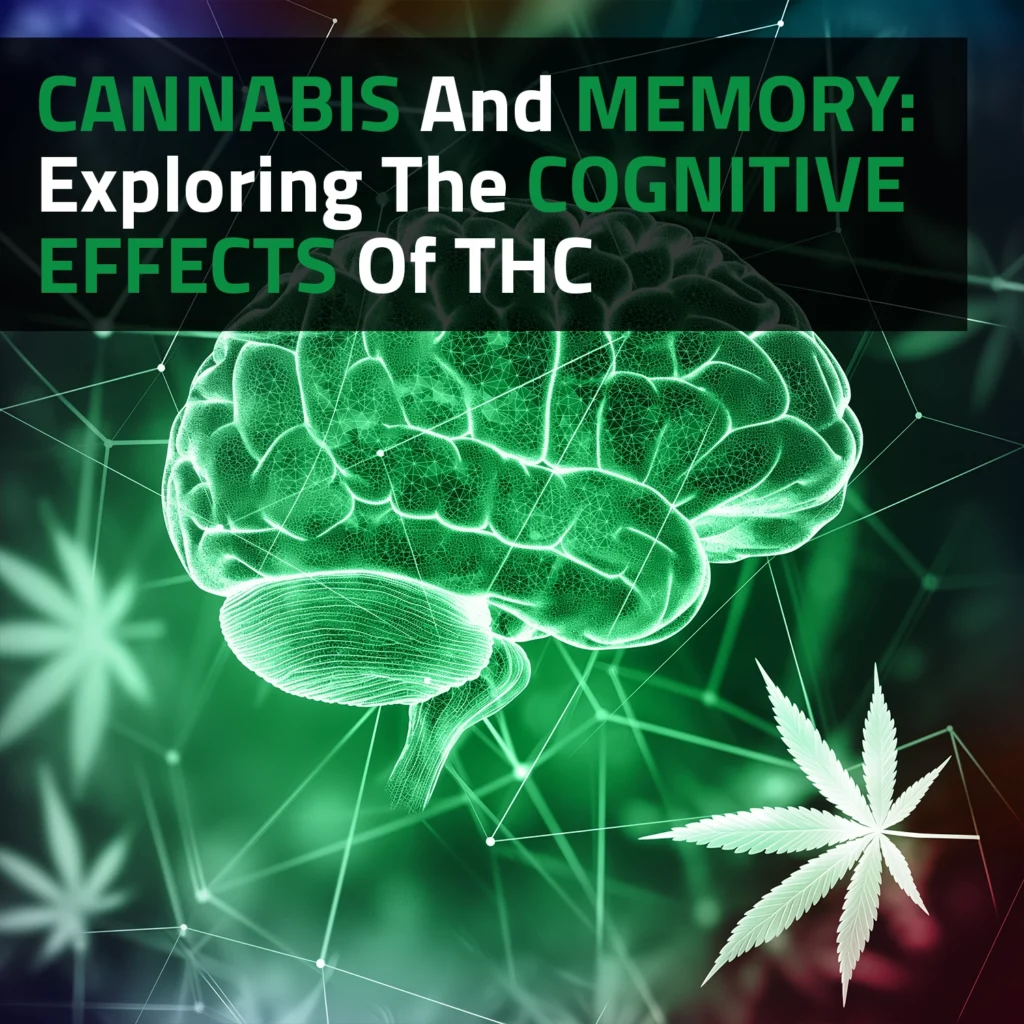The relationship between cannabis and cognitive function has long been a topic of scientific interest. This specifically pertains to the impact of tetrahydrocannabinol (THC), the main psychoactive component of cannabis. One area that has garnered significant attention is the effect of THC on memory. In this article, we will explore how THC influences memory, breaking down its effects on different types of memory, the mechanisms behind these changes, and what long-term use could mean for cognitive health.
How Memory Works: An Overview
Before we get into the effects of THC, it is important to understand the different types of memory involved in cognition, including:
- Short-term memory: Also known as working memory, this is the brain’s ability to hold and manipulate information for short periods. This is necessary for tasks like keeping a phone number in your head or following multi-step instructions.
- Long-term memory: This is where information is stored for extended periods, sometimes for life. It includes explicit memory (conscious recollection of facts and events) and implicit memory (unconscious memories like motor skills, which allow us to perform tasks like riding a bike without actively thinking about how to do it).
- Episodic memory: A type of explicit memory that involves the recollection of personal experiences and specific events, like remembering what you had for breakfast yesterday or where you went on vacation last year.
THC And Short-Term Memory
One of the most well-documented effects of THC on memory is its impact on short-term memory. Research shows that THC temporarily impairs the brain’s ability to retain and process new information. This impairment occurs because THC affects the hippocampus, the brain region responsible for converting short-term memories into long-term ones.
THC binds to cannabinoid receptors (CB1) located in the hippocampus, interfering with neural communication. As a result, people under the influence of THC often find it harder to remember recent events or follow conversations, which is why some users experience a sense of “foggy” thinking or difficulty concentrating after consuming cannabis.
These effects are generally dose-dependent. Lower doses of THC may cause mild memory disruption, while higher doses are more likely to produce significant impairments in short-term memory. The good news is that these memory issues are typically temporary, resolving once the THC leaves the system. However, with frequent use, short-term memory problems could become more noticeable.
THC And Long-Term Memory
The effects of THC are more nuanced when it comes to long-term memory. While short-term memory is primarily affected by acute THC consumption, long-term memory impacts are often associated with chronic or prolonged use of cannabis. Studies indicate that heavy, long-term cannabis users may experience difficulties with:
- Consolidation of new information: THC disrupts the process of converting short-term memories into long-term ones. This means that, over time, cannabis users may find it harder to learn new information or retain it over extended periods.
- Retrieving stored information: Some research suggests that THC can make it more difficult to recall previously learned information. This effect may be subtle in occasional users but can become more pronounced with chronic use.
A crucial distinction, however, is that these memory impairments do not affect all long-term cannabis users equally. Factors like age, frequency of use, THC potency, and the age at which someone began using cannabis play significant roles in determining how THC influences long-term memory. For instance, individuals who began using cannabis during adolescence, when the brain is still developing, are more likely to experience lasting cognitive effects compared to those who start using it as adults.
THC’s Effect On Episodic Memory
The ability to remember specific events and experiences (episodic memory) is another area where THC has a noticeable effect. Given THC’s impact on the hippocampus, it is no surprise that episodic memory is particularly vulnerable to disruption. Individuals who consume cannabis may find it difficult to remember specific details about events that occurred while they were under the influence, and this effect can extend beyond the immediate high.
Some studies show that regular cannabis users may have a reduced ability to recall personal experiences compared to non-users. This can impact day-to-day functioning, as episodic memory is vital for tasks like recalling appointments or remembering personal milestones.
The Long-Term Cognitive Effects Of THC Use
One of the biggest questions regarding THC and memory is whether long-term or heavy use can cause permanent memory deficits. Research in this area is ongoing, but evidence so far suggests that some memory impairments may persist after long-term, heavy use.
For example, studies on chronic cannabis users who abstain for an extended period show mixed results. Some users regain their cognitive abilities, including memory, after a few weeks or months of abstinence, while others continue to experience slight memory deficits even after quitting. This variability underscores the complexity of how THC interacts with individual brain chemistry.
One theory is that repeated exposure to THC may cause changes in the brain’s endocannabinoid system, which could affect memory processing. The endocannabinoid system plays a vital role in modulating memory and learning, and heavy cannabis use may disrupt its balance over time. However, more research is needed to fully understand whether these changes are reversible or permanent.
Potential Therapeutic Benefits Of THC For Memory-Related Disorders
While THC may impair memory in certain contexts, it also shows potential for therapeutic use in memory-related disorders. Research into THC’s effects on conditions like Alzheimer’s disease and PTSD (post-traumatic stress disorder) suggests that THC may have protective or even restorative effects on memory under certain circumstances.
- Alzheimer’s disease: Some studies indicate that THC may reduce the formation of amyloid plaques in the brain, which are associated with Alzheimer’s disease. These plaques interfere with normal brain function, contributing to memory loss and cognitive decline. By slowing plaque formation, THC could potentially offer therapeutic benefits for people with Alzheimer’s.
- PTSD: PTSD often involves intrusive memories and flashbacks, and THC has been studied as a possible treatment for reducing the emotional impact of these memories. By dampening the brain’s stress response and altering memory recall, THC may help individuals with PTSD manage their symptoms more effectively.
The relationship between THC and memory is complex. While short-term memory is more likely to be impacted by acute cannabis use, long-term and episodic memory can also be affected, particularly with chronic use. Factors like the frequency of use, age at first use, and THC potency play critical roles in determining the extent of memory impairment. For most users, the effects on memory are temporary and resolve after the THC leaves the system.
-
 DynaVap – “M7” VaporizerR1,750.00Rated 5.00 out of 5 based on 1 customer rating
DynaVap – “M7” VaporizerR1,750.00Rated 5.00 out of 5 based on 1 customer rating -
 DAVINCI MIQRO-C VaporizerR2,750.00Rated 5.00 out of 5 based on 1 customer rating
DAVINCI MIQRO-C VaporizerR2,750.00Rated 5.00 out of 5 based on 1 customer rating -
 BLK Black Mamba Dry Herb VaporizerR850.00
BLK Black Mamba Dry Herb VaporizerR850.00 -
 BLK Kiss Dry Herb VaporizerR1,050.00
BLK Kiss Dry Herb VaporizerR1,050.00





